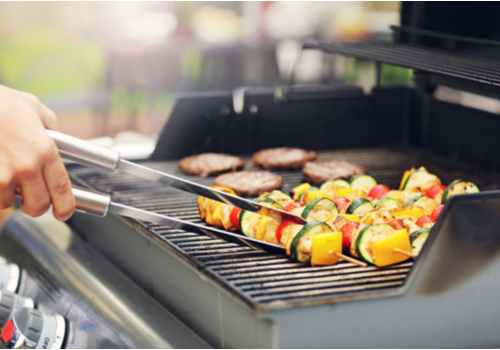
2020
It is summer and that means being outside, grilling burgers, eating potato salad and having pool parties. But summer fun also comes with burn treatment, increased cases of food poisoning, and pool-related accidents.
Grilling Safety
By following these simple guidelines from the Federal Emergency Management Association (FEMA) and the U.S. Fire Administration, you are much more likely to avoid getting hurt:
- Keep your grill at least three feet from other structures, such as your house, garage, trees, and deck rails. This “safe zone” will help keep your home, kids, and pets safe. The farther away, the better when it comes to grills.
- Always open your gas grill before lighting it.
- Never walk away from a lit grill.
- Any food prep and utensils needed should brought out before you grill.
- Keep a spray bottle of water next to your grill to spray any flames that get too big. A fire can double in size every minute, so it is best to stay close-by and always be prepared.
- Keep your grill clean. Clean your grill before and after each use. This will remove any excess grease that could start a fire. Even electric pellet grills need cleaning to avoid a dangerous grease fire.
- For coals, place them in a metal can with a lid once they have cooled.
- Never use a grill indoors.
Burn Treatment
Accidents happen, even when you follow all the safety rules. According to the National Fire Protection Association, an average of 19,700 patients go to the emergency room every year due to grilling-related accidents.
Seek medical attention immediately if a burn is deep and blisters right away or muscle or bone can be seen. Additionally, seek medical help if:
-
- The burn is on the face, fingers, hands, feet, genitals or a joint.
- The burn is surrounding a body part and/or is more than three inches wide.
- The burn victim is younger than five or older than 70.
- The burn is infected (signs of burn infection are redness, severe pain, pus at the burn site or you have a fever).
Minor burns may be able to be treated at home. If you are not sure, call your Primary Care Provider or visit a local urgent care. Some of the guidelines that you may receive related to a minor burn include the following:
- Keep it cool. Remove any clothing and jewelry around the burn. Place the burned area in a tub or sink of cool water for 15 to 20 minutes. Do not place ice on the burn. Ice can cause even more damage to your body by slowing blood flow to the burn area.
- Keep it clean. Clean the burn area with soap and water. Cover with nonstick gauze or other cotton material. Do not use cotton balls, which can leave cotton fibers in the wound or tear open skin that is protecting the burn. Though it may sound odd, using cling wrap from your kitchen will also work very well. Cling wrap will not stick to the wound and will keep the wound from becoming infected or a blister torn open.
- Pain management. Ibuprofen (for example, Advil) will help reduce pain, as well as reduce inflammation in the first 24 hours. Apply aloe-vera gel as needed to help with pain relief. Do not use butter or milk. The fat in the butter will make the pain worse by slowing the release of heat from the skin. The bacteria in the milk can cause an infection.
- Prevent infection. Over-the-counter antibiotic creams usually are not helpful. They do not make anything worse, but studies have shown that burns heal faster using honey than creams. Honey is anti-inflammatory (keeps swelling down) and antibacterial (keeps bacteria from growing). The fatty acids in honey repair skin and tissue damage. Do not use hydrogen peroxide, white vinegar, or toothpaste. Though you may have heard stories of these “home remedies,” all three are dangerous to a burn and will damage the body even more.
Blisters. Do not touch the blisters. Touching them could cause infection. Blisters are your body’s natural response to avoid infection. Touching or popping the blister could make things worse. If the blister is larger than your thumbnail, go to urgent care or the emergency room.
Food Prep and Storage: How to Avoid Food Poisoning
Summer months are the peak months for food poisoning cases. Eating outdoors in warm weather causes germs in food to thrive. Follow these tips provided by the Centers for Disease Control and Prevention (CDC) to avoid food poisoning and stay safe during peak grilling season:
- Keep meat separate. When grocery shopping, get meat last. Place the meat in individual plastic bags when possible and keep meat in separate grocery bags when checking out. This will prevent your meat from contaminating other foods.
- Keep meat cool. Keep meats refrigerated or frozen until ready to grill. Defrost meat in the fridge overnight, if frozen.
- Keep everything clean. Wash hands with soap and water before and after handling raw meat. Clean all work surfaces, utensils, and the grill before and after use as well. Use a damp cloth to clean the grill. Bristles from wire brushes can get loose and get stuck in food while cooking. If you use a wire brush, examine the grill surface carefully after cleaning.
- Avoid cross-contamination. Any marinades or sauces that touched raw meat should be thrown out. If you marinated meat, do not use that marinade again on other foods or while the meat is grilling. Throw it away. Use a clean plate and clean utensils to remove cooked meat from the grill.
- Cook to safe temperatures. Use a food thermometer to be sure your meat is cooked thoroughly. The BBQ temperature should be at least 225°F to 300°F while cooking.
- Beef, pork, veal and lamb should be cooked to 145°F
- Fish should be cooked to 145°F
- Hamburgers/ground beef should be cooked to 160°F
- Poultry and pre-cooked meats should be cooked to 165°F
Keep all cooked meats at 140°F or warmer until ready to serve.
Keep food refrigerated. Separate leftovers into small containers, cover and refrigerate or freeze when done. Food should be put away within two hours of cooking. If it is warmer than 90°F outside, food should be brought inside and put away within one hour.
Pool Safety
According to the American Red Cross, 69% of children who drown were not even supposed to be in or near the water. Here are a few tips to avoid this tragedy:
- Install barriers. If you have a pool, be sure the pool has proper barriers, covers and alarms. Fences should be at least four feet high and should surround the pool on every side. A self-closing, self-latching gate should be the only point of entry.
- Water watcher. Appoint someone to watch the water at all times when children are swimming. Always stay within arm’s reach of children. Do not try to multitask, including reading, talking on phone, playing on the phone, etc. But do keep your phone close in case of an emergency. In the event a child is missing, always check the pool first.
- Drain covers. Install anti-entrapment covers for the drains and safety release systems. The suction from pool drains can be so powerful even an adult could become trapped. Teach children to stay away from drains. Even with proper covers, hair, jewelry, bathing suits and even arms and legs can get stuck.
- Learn CPR. CPR can save a life, so it is always helpful to know CPR and/or become certified in CPR before having a pool party, especially for the designated water watcher. CPR classes are offered through many hospitals, community centers, and even the Red Cross.
Jai Medical Systems has the support and tools you need to stay safe and healthy. Call our Customer Service Representatives at 1-888-JAI-1999 to learn more about our programs or contact us using our online form.
 Did you know that your IE browser is outdated?
Did you know that your IE browser is outdated?





